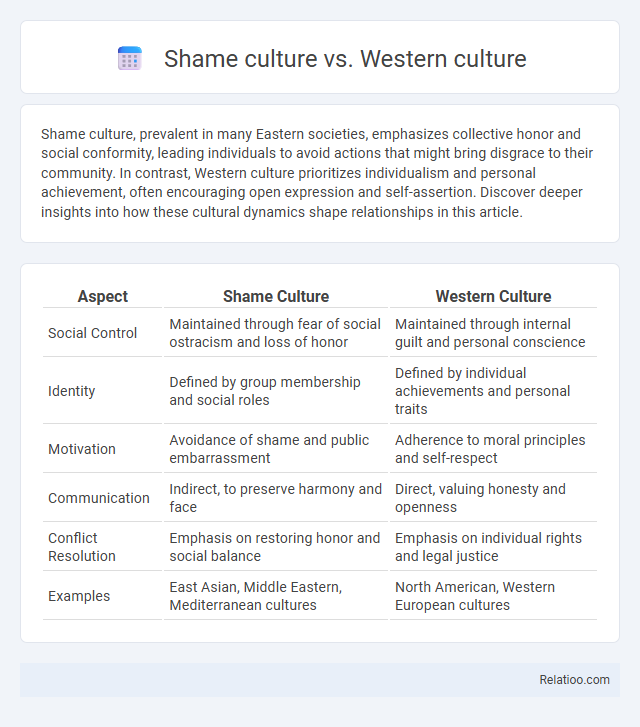Shame culture, prevalent in many Eastern societies, emphasizes collective honor and social conformity, leading individuals to avoid actions that might bring disgrace to their community. In contrast, Western culture prioritizes individualism and personal achievement, often encouraging open expression and self-assertion. Discover deeper insights into how these cultural dynamics shape relationships in this article.
Table of Comparison
| Aspect | Shame Culture | Western Culture |
|---|---|---|
| Social Control | Maintained through fear of social ostracism and loss of honor | Maintained through internal guilt and personal conscience |
| Identity | Defined by group membership and social roles | Defined by individual achievements and personal traits |
| Motivation | Avoidance of shame and public embarrassment | Adherence to moral principles and self-respect |
| Communication | Indirect, to preserve harmony and face | Direct, valuing honesty and openness |
| Conflict Resolution | Emphasis on restoring honor and social balance | Emphasis on individual rights and legal justice |
| Examples | East Asian, Middle Eastern, Mediterranean cultures | North American, Western European cultures |
Understanding Shame Culture: Key Characteristics
Shame culture prioritizes social harmony and community reputation, where individuals regulate behavior based on the fear of public disgrace and social sanctions. In contrast, Western culture often emphasizes individualism, personal responsibility, and internal guilt as moral guides. Understanding shame culture involves recognizing the importance of collective identity, honor, and the external validation that shapes social interactions and decision-making processes.
Defining Western Culture: Core Values and Beliefs
Western culture emphasizes individualism, personal freedom, and self-expression, shaping social norms and behaviors around autonomy and rights. Core values include democracy, equality, and rationality, influencing legal and educational systems to foster critical thinking and open dialogue. Your understanding of Western culture highlights its contrast with shame culture, where collective reputation and social harmony often override personal choice.
Historical Roots of Shame Culture
Shame culture originates from ancient societies where collective honor and social harmony dictated behavior, often traced back to Confucian East Asia and Mediterranean civilizations emphasizing community reputation. Western culture, by contrast, evolved from Judeo-Christian and Greek traditions prioritizing individual conscience and guilt as internal regulators of conduct. Understanding these historical roots helps you grasp how shame functions as an external social force, while guilt operates more as an internal moral compass.
Origins and Evolution of Western Cultural Norms
Western cultural norms originated from ancient Greek democracy, Roman law, and Judeo-Christian ethics, emphasizing individualism, personal rights, and rationality. Over centuries, Enlightenment thinkers advanced values of autonomy, freedom of expression, and self-ultimacy, shaping shame culture's contrast by prioritizing internal guilt over external social judgment. These evolving Western principles fostered societies where personal accountability and legal frameworks surpass familial or community-based shame mechanisms typical in shame cultures.
Social Control: Shame vs. Guilt Mechanisms
Shame culture relies on social control through public perception, where your reputation and communal standing dictate behavior, emphasizing external judgment over internal conscience. Western culture primarily uses guilt mechanisms, focusing on individual responsibility and internal feelings of remorse to regulate actions. These contrasting systems shape societal norms by prioritizing collective honor in shame cultures and personal moral accountability in Western contexts.
Individualism in Western Societies
Western culture emphasizes individualism, promoting personal freedom, self-expression, and autonomy as key values. Shame culture, often found in collectivist societies, prioritizes social harmony and conformity, where individuals are motivated by fear of social judgment and loss of face. Understanding these cultural dynamics can help you navigate social expectations and improve interpersonal relationships across diverse environments.
Collectivism in Shame-Based Cultures
Shame culture, often linked to collectivist societies in Asia and the Middle East, emphasizes group harmony and social approval, where individuals prioritize family and community reputation over personal desires. Western culture, rooted in individualism, values personal autonomy and self-expression, encouraging people to assert their own identity and goals. Understanding these cultural dynamics helps you navigate social expectations and communication styles effectively in diverse environments.
Impact on Personal Identity and Behavior
Shame culture emphasizes collective values, where Your sense of self is tightly linked to social reputation and community approval, leading to behavior driven by external judgment and fear of dishonor. Western culture prioritizes individualism and self-expression, fostering personal identity shaped by internal values and autonomy, which encourages behavior centered on self-fulfillment and personal responsibility. The impact on personal identity in shame cultures often results in conformity and restraint, while Western culture promotes openness and self-assertion.
Cross-Cultural Conflicts and Misunderstandings
Cross-cultural conflicts arise when shame culture, which prioritizes group harmony and social reputation, clashes with Western culture's emphasis on individualism and direct communication, leading to misunderstandings about intentions and behaviors. In shame cultures, your actions are closely tied to family and community honor, causing public criticism to carry significant social consequences, whereas Western cultures may prioritize personal expression and accountability without the same collective weight. Navigating these differences requires sensitivity to how respect, conflict resolution, and face-saving strategies vary, helping avoid misinterpretations and fostering clearer intercultural communication.
Navigating Cultural Differences in a Globalized World
Shame culture, prevalent in many Asian and Middle Eastern societies, emphasizes social harmony and community reputation, whereas Western culture often prioritizes individualism and personal achievement. Navigating these cultural differences requires sensitivity to collective values in shame cultures, where indirect communication and face-saving practices dominate, contrasting with the directness valued in Western societies. Understanding these contrasting norms is essential for effective cross-cultural communication and collaboration in an increasingly globalized world.

Infographic: Shame culture vs Western culture
 relatioo.com
relatioo.com